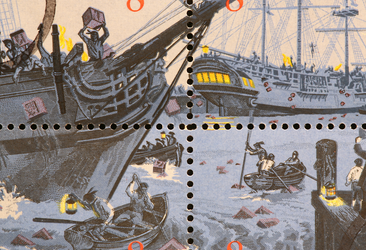Fine Teas of the Boston Tea Party
Posted by Peter Martino on Sep 13th 2022
No Taxation without Representation
After the French & Indian War in 1763, the government of King George III sought to tax the American colonies to help recoup war costs. The Stamp Act of 1765 and Townsend Acts of 1767 riled the colonists, severely straining relations with mother England.
However, the Crown's attempt to impose a tax on tea spurred colonial revolt and sowed the seeds of the American Revolution. Colonists disclaimed the Townsend Acts claiming no obligation for taxes levied by a Parliament where they had no representation.
The Beaver, Dartmouth, and Eleanor
In response, the British government retracted the taxes except one on tea to demonstrate a right to tax colonists.
Under a complex plan, in May 1773, Parliament awarded the East India Company a monopoly on importing tea to America and simultaneously reduced the duty on imported tea in the colonies. This scheme would allow American colonists to purchase tea less expensively than ever but would acknowledge Parliament's right to tax.
Parliament assumed that since tea was a staple of life in America, colonists would rather pay the tax than deny themselves the pleasure of tea.
In Boston, the subsequent arrival of three tea ships, the Beaver, Dartmouth, and Eleanor, ignited a fury. The crisis climaxed on December 16, 1773, when a large gathering at Old South Meeting House resolved that the tea ships should leave Boston Harbor without payment of duty. However, the Collector of Customs refused to allow the vessel to leave.
Party Time
That evening, a group of about 200 men, some disguised as Native Americans, chanted and marched to the wharf, boarded the ships, and dumped the tea cargo into the Harbor. They dumped 340 chests into the Harbor, comprising approximately 93,000 pounds of tea. The value of this tea was roughly 25,000 British pounds sterling then (about $2 million in today's currency).
The Fine Teas
Of the tea dumped, according to Benjamin Wood Labaree's The Boston Tea Party, 75 chests were green tea, of which 15 were Young Hyson, the finest grade of green tea then available to the colonies. The remaining tea was black, of which 15 chests were Congou, the finest quality.
Artisans in the Anhui region of Eastern China still produce Young Hyson today. They harvest young leaves before the spring rains and masterfully craft each leaf into the shape of a delicate brow. The leaves are wok-fired to prevent oxidation and, during the second firing, are tightly twisted by hand. The tea brews golden-yellow with a slight sweetness from the young leaves and a robust flavor uncharacteristic of most green teas. No wonder it was a favorite in the colonies!
(Rose) Congou is a Chinese black tea with large, unbroken leaves scented with petals from tiny Chinese pink roses. Capital Teas Rose Congou is from the Fujian region on the southeast coast of China and is layered five times with fresh rose petals.
The Results of the Protest
Reaction to the Boston Tea Party in London was strong. Shortly afterward, in March 1774, Parliament passed the Intolerable Acts closing the Port of Boston. This action further ignited the flames of discontent in the colonies that ultimately led to the American Revolution. Two and a quarter centuries later, most Americans enjoy these and other teas free of taxes.

